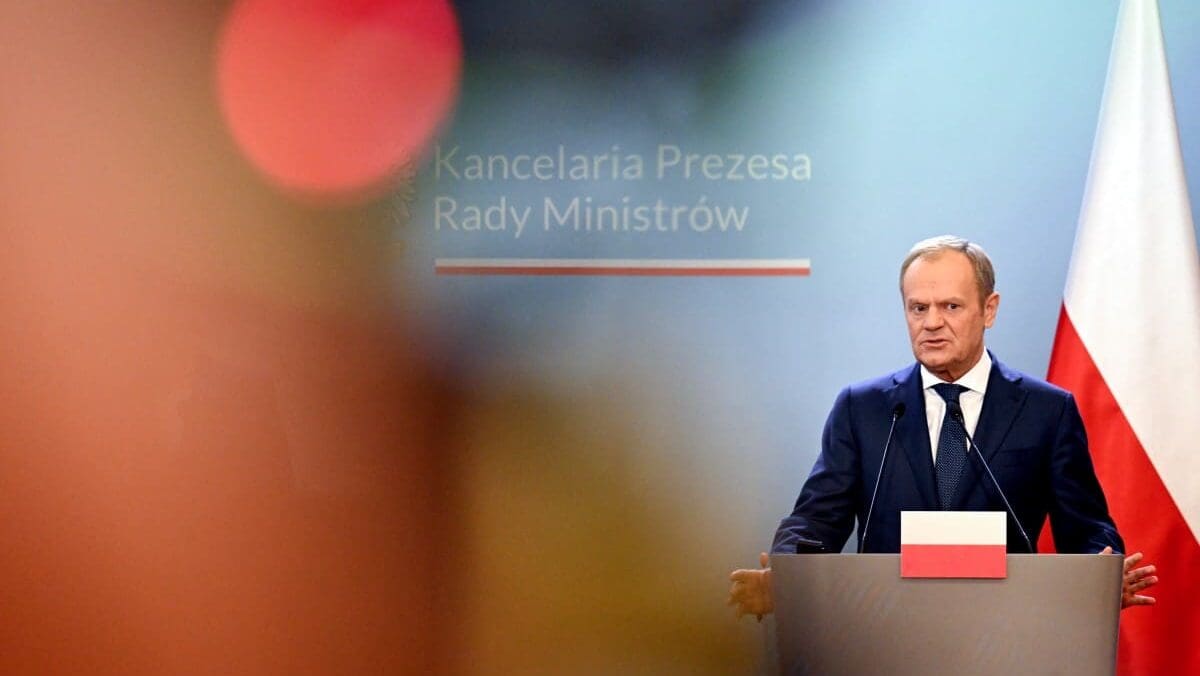
Polish PM Donald Tusk
Photo: Sergei GAPON / AFP
Donald Tusk’s centrist governing coalition is having trouble reaching a consensus about a draft law introducing same-sex unions submitted by a coalition member. Once again, the prime minister seems caught between what’s expected of him in Brussels and the majority opinion in Polish society.
The draft bill would introduce same-sex unions in Poland for the first time, covering the right to a joint surname, similar tax status to married couples, the right to obtain the partner’s medical information, as well as the right to inheritance and to take over the care of the partner’s children in case of death.
The legislation was submitted by Nowa Lewica (‘New Left’), the government’s most junior coalition partner sitting in the social democrat (S&D) group in the European Parliament (EP), which campaigned during last year’s parliamentary elections on the promise to eventually introduce full same-sex marriage in the country.
However, the agrarian center-right Polish People’s Party (PSL/EPP) has stood in opposition to several elements of the law. PSL leader and defense minister Władysław Kosiniak-Kamysz said his party rejects the right of homosexuals to care for a partner’s children, while requesting further discussions on inheritance rights and to consult the partner’s medical information.
The liberal Poland 2050 (Renew), PSL’s partner in the Third Way alliance and the other coalition partner of Tusk’s Civic Platform, announced its support for the law, with leader Szymon Holownia trying to pressure Kosiniak-Kamysz to change his mind as well.
This leaves only PM Donald Tusk’s centrist Civic Platform, by far the largest part of the governing coalition, to take a definitive stand in the dispute. It’s striking that Tusk was unable to make a decision in the past six months.
During the campaign, Tusk said that introducing same-sex unions would be “one of the first decisions” he would make after coming to power, but he has been trying to avoid the discussion ever since forming his coalition government last year. Back then, the prime minister promised that same-sex adoption would be part of his “march to modernity” as well, while adding that Polish society had a long way to go until then.
The draft legislation follows a ruling from the European Court of Human Rights (ECHR) which decided in favor of five same-sex couples suing for discrimination and ordered Warsaw to introduce civil unions in December.
It’s not the first time that the ECHR has pressured a country into adopting similar legislation, as the court was instrumental in strong-arming the Italian government back in 2010 into introducing same-sex unions.
As of now, Poland is one of five EU countries where same-sex civil partnerships are not yet recognized—the others being Romania, Bulgaria, Lithuania, and Slovakia. The court ruled against Romania on the same issue last year, but the social democrat government refused to comply simply because “Romanian society [was] not ready” yet.
Now Tusk is in a similar, but even tougher position. Promising same-sex unions during the campaign allowed him to scoop up a larger share of the leftist vote, but delivering on that promise would alienate many of his primary, center-right voters. Having to choose between two of his coalition partners is not an easy decision either, but that’s a natural consequence of building a centrist coalition across ideological borders.
Moreover, he’s got the ECHR and the Council of Europe breathing down his neck, which only legitimizes and emboldens the leftists within his cabinet. Adding to the pressure, the Polish ombudsman also warned the government that if they continue to disagree and fail to pass the legislation and introduce same-sex partnerships, that would violate the European Convention on Human Rights.
“The very consistent case law of the European Court of Human Rights, and the December’s ruling, shows that it is the state’s duty to institutionalize same-sex unions,” ombudsman Marcin Wiacek said.
At least the Polish national conservative parties, the country’s main opposition forces, don’t need to entertain such dilemmas.
The Law and Justice (PiS), the country’s largest party that fell out of government at the end of last year, unequivocally rejected the ECHR’s ruling. The PiS government argued that “the traditional concept of marriage as a union of a man and a woman constituted Poland’s social and legal heritage,” and that same-sex unions are merely the first step to undermining the institution of marriage.
The smaller sovereigntist party Konfederacja has also rejected the idea of introducing same-sex partnerships. “Most issues, like the access to medical information, can be legally solved in many other ways, without introducing civil unions,” the party’s co-leader Krzysztof Bosak said.
